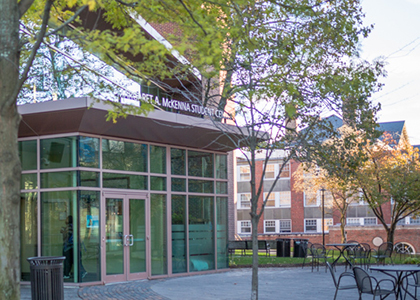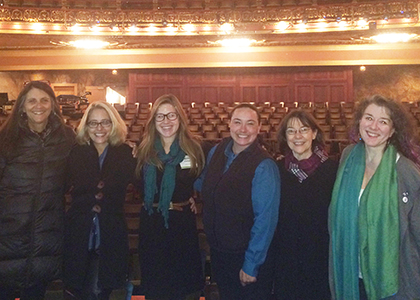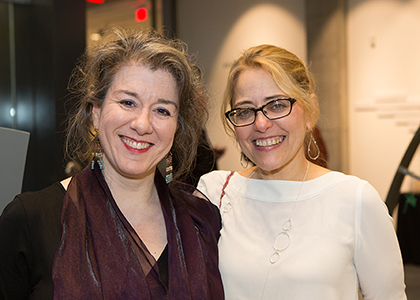An estimated one in five women will be the victim of sexual assault during her college years.

Lesley was selected as one of 20 schools from across the country to
participate in a national campus violence-prevention program.
Improved prevention is critical, which prompted our Women’s Center to secure a grant for an innovative new program to provide training and support around gender-based violence.
Lesley was selected as one of 20 schools from across the country to participate in the campus violence-prevention program, securing a $10,000 grant to support the work.
“It’s so crucial to protect all students from gender-based crimes, and this is providing a lot of support around creating that system,” said Dr. Diana Direiter, co-director of the Women’s Center. “There is great work going on here in different places, and this is helping us to centralize and strengthen it.”
Last fall, a Lesley delegation participated in a summit for the program, titled “The National Leadership Institute on Changing the Narrative on Campus Gender-Based Violence.” Our multi-disciplinary team included staff from Public Safety, our Women’s Center, the Counseling Center and other campus offices, all of whom were trained on developing and implementing action plans to prevent and respond to sexual assault.
The trauma-informed curriculum promotes victim-centered best practices in law and advocacy for preventing and responding to gender-based violence on campus.
Building a ‘holistic structure’
Other Lesley participants in the program include Associate Dean of Residence Life Nancy Galvin, Counseling Center Director Magi McKinnies, Public Safety Capt. Nicole O’Leary, graduate student Molly Pistrang, who is the research intern for the Women’s Center, and Associate Professor Amy Rutstein-Riley, who is co-director of the Women’s Center.

(L to r) Counseling Center Director Magi McKinnies, Associate Professor
Amy Rutstein-Riley, graduate student Molly Pistrang, Public Safety
Capt. Nicole O’Leary, Associate Dean of Residence Life Nancy Galvin,
and Assistant Professor Diana Direiter.
“We are part of a growing learning community committed to ending gender-based violence on our campuses,” said Dr. Rutstein-Riley, who is also dean of faculty. “It’s not only women who experience the range of gender-based violence and stalking. Men are also targeted, particularly in gay relationships.”
The program curriculum includes training and resources around:
- Fundamentals of gender-based violence and trauma
- Campus cultures and climate
- Prevention and education
- Response, policy and adjudication
“The institute provided a common vocabulary,” said Direiter, who is an assistant professor of psychology. “We have solid policies in place, but not necessarily a trauma-informed team approach, which is current best practice. We are shifting the culture and building a holistic structure.”
Campus climate survey is a first step in culture shift
This month, which is National Sexual Assault Awareness Month, the Women’s Center is launching a campus climate survey for all undergraduates to aid in gathering information to assist with this important initiative.

Professors Diana Direiter (left) and Amy Rutstein-Riley are co-directors
of the campus Women’s Center.
“We are using the training and the funds to create an action plan around gender-based violence on campus, which includes surveying our community,” said Direiter. “We want to start with an accurate sense of the culture, and how people think and react.”
The project will then comprise broader work with faculty and staff to train employees on how to think and talk about gender-based violence, how to understand everyone’s role and responsibility for campus safety, and how to avoid blaming victims and understand a trauma-informed approach.
“We want to go beyond just being compliant,” said Direiter. “This is a culture shift.”
She continued, “We are doing this work with the ethos of care so that we all ask, ‘What can I do to help this person?’ and so we all understand what trauma looks like and what trauma does to you. We also need to understand the ripple effect of people who are discouraged by how they feel treated. In trauma, perception is the reality.”
Eventually, the goal is to incorporate the work into Lesley’s curriculum, dovetailing with our existing expertise and programming, including our work around trauma-informed schools and in our counseling and expressive therapies programs.
“We’re looking at how we bring this into our classrooms and our scholarship to reach our students, beyond bystander training,” said Rutstein-Riley.
The $10,000 grant for the National Leadership Institute is funded by the Avon Foundation for Women. Lesley was selected from among 70 applicants for the grant.
Resources and support for students
Resources and support are available to students who have experienced or witnessed sexual violence.
Information about on-campus and off-campus resources, confidential resources, campus safety, university policies and other information is available here on our Sexual Assault Prevention and Services web page.